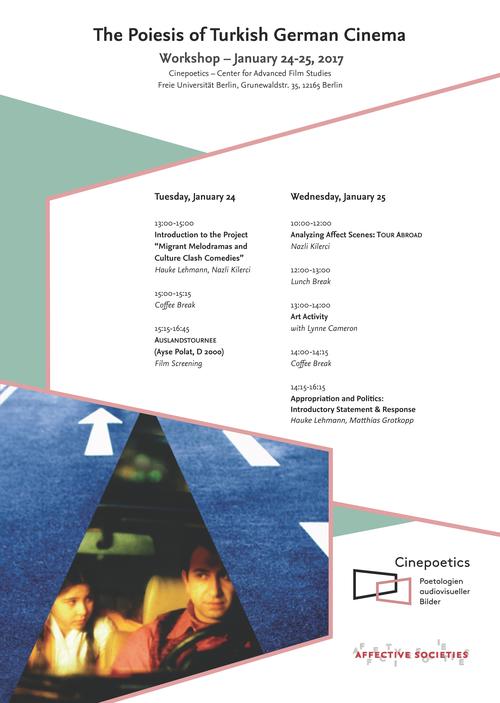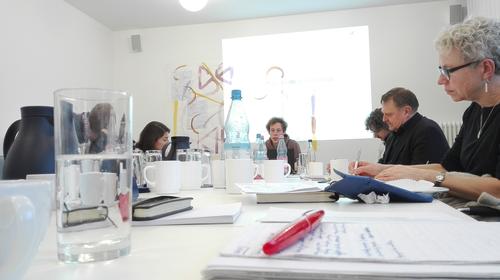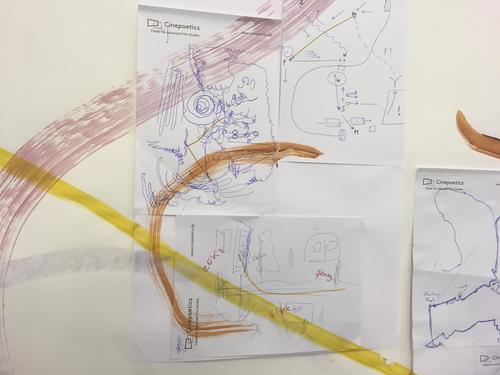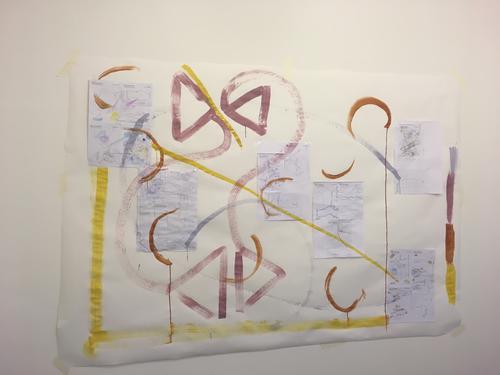The Poiesis of Turkish-German Cinema
24./25.01.2017 | Workshop der Kolleg-Forschungsgruppe Cinepoetics mit Nazlı Kilerci, Hauke Lehmann, und Matthias Grotkopp.
Why do we talk about "Turkish-German cinema"? What are the theoretical and political problems (and perspectives) inherent to this term, and how can we conceptualize it in a productive manner? These and related questions were at the center of the workshop "The Poiesis of Turkish-German Cinema," organized by the research project "Migrant Melodramas and Culture Clash Comedies" (a subproject of the Collaborative Research Center 1171 "Affective Societies"), in cooperation with the Cinepoetics Center for Advanced Film Studies. Speakers included Nazlı Kilerci, Hauke Lehmann, and Matthias Grotkopp (all Freie Universität Berlin). The workshop was hosted by Prof. Hermann Kappelhoff; among the discussants were Prof. Erica Carter (King's College London), Prof. Lynne Cameron (Open University, UK), James McFarland (Vanderbilt University), as well as Anke Hennig (Berlin University of the Arts).
From left to right: Nazlı Kilerci, Hauke Lehmann, Matthias Grotkopp, Hermann Kappelhoff, Erica Carter
The event commenced with a general introduction to the project, with a focus on deconstructing the predominant approaches to the so-called Turkish-German cinema. As an alternative, a heuristic approach was proposed which allows for a comparative analysis of the films grouped under this label – foregrounding the encounter between screen and audience, understood as an aesthetic experience. It is this experience, which must be examined first if we are to understand how the films position themselves in an affective economy where images of migration and integration circulate.
The second day began with a close analysis of some aspects of the film Auslandstournee (Tour Abroad, Ayşe Polat 1999), exemplifying the methodological approach of the project and leading into a discussion of the film as well as de Certeau's concept of appropriation, which is meant to provide a key to the political significance of the Turkish-German cinema.
Nazlı Kilerci talked about the spatiotemporal constellations of Auslandstournee and the ways they open up an experiential dimension for a type of affect scene that revolves around a sense of exposure. This exposure is about the accentuated production of a certain visibility that is realized on the level of aesthetic expressivity and experience as the process of "becoming an object for viewing." It encompasses an affective spectrum extending from embarrassment, ridiculousness, and shame over anger, defiance and vulnerability to joyful exuberance. Accordingly, the scenes in question employ a range of different generic modalities, most notably those of comedy and melodrama.
Many of these affective qualities are connected to figurations of the grotesque and disproportional peculiarity, combining theatrical and spectacular dimensions of the filmic image. For instance, they appear in the staging of wedding ceremonies, religious celebrations or parties, where surprise, expectation, disappointment and catastrophe are invoked. Here, the physicality or materiality of characters and objects or is emphasized in the broadest sense, offering different perspectives on what could be called 'life world.' However, a 'togetherness' is not involved in this physicality. Each character is exposed and exhibited in a grotesque masquerade, which renders each body deviant, particular, detached and peculiar. This accented visibility creates a reflexive aspect for the spectators, enabling them to reflect on their own viewing and feeling. The film's shared referential space thus provides the conditions for a fragile feeling of a "we" as specific affective mechanisms for inclusion and exclusion, without dealing with political attributions in the very first place.
Kilerci's presentation was followed by an art activity led by Lynne Cameron. The experience of watching Auslandstournee was transformed into the fabrication of drawings, which were then combined into a collaborative artwork. After this creative input, the last session, with Hauke Lehmann and a response by Matthias Grotkopp, tried to link the concept of appropriation explicitly to the field of the political, closing the workshop and indicating productive avenues for further research.
According to Grotkopp, appropriation positions us in "the no-man's land between the produced things and the social actions done with them." Films, or media forms in general, are not the source of static meanings to be deciphered, but they are the tertiary stage of an elusive process of consuming and appropriating. Secondly, the films become visible as ways in which the spectator grasps his or her own subjectivity as an intersection of plural collectivities. Thus the term 'appropriation' makes us aware of the fact that each individual act of reception points beyond itself, that it is also an act of positioning oneself with regard to a community, to what is appropriate, what is proper. In this perspective, Turkish-German cinema becomes a conglomerate of different, overlapping, interchanging, interfering generic and affective modalities. It points to the fact that, by and through appropriation, the spatial, temporal and affective relations we live in come into being in the first place and shift constantly.



